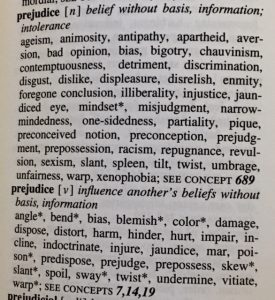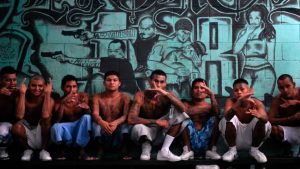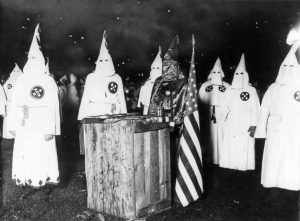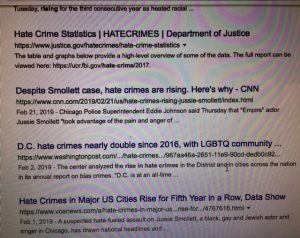Prejudice is an unjustified or incorrect attitude (usually negative) towards an individual based solely on his/her membership in a social group. In my opinion, prejudice is relatively benign for the target person if the prejudiced person does not act on the negative attitude. Unfortunately, this is seldom the case.
Discrimination is an action or behavior (including verbal)—usually negative—towards an individual or group of people on the basis of the prejudice. This is where the bad happens. Employment opportunities foreclosed. Inequality in lending practices. Lack of access to educational opportunities. Denial of goods or services (e.g., refusing to make a wedding cake for the wedding of a gay couple). Hate crimes.
A classic example of prejudice leading to negative behavior:
So, one big question for you as a writer is what your character does as a reflection of his/her prejudice.
Although prejudice is an umbrella term for all sorts of -isms (as seen in the image above) it is also a subset of attitudes. And prejudice includes all three components of an attitude: cognitive, behavioral, and affective—how one thinks, behaves, and feels about a person, object, or act.
But before you can write realistically about a prejudiced character, you need to decide what function the prejudice serves for this character.
Cognitive adjustive: Lacking other information, one accepts stereotypes and/or prejudiced views as a way of knowing how to think and behave with a stranger.
Social normative: Holding attitudes—including prejudice—that allow the person to fit into a group or social setting. This might be family, gang, town, workplace, social class—any group the person wants entry to.
Ego-defensive: The person is basically insecure and adopts a prejudice to bolster feelings of self-worth. If a person has perceived lacks or failures, one way to feel better about oneself is to develop negative attitudes toward a whole group of people who, by the nature of who they are, can be viewed as inferior.
So, do you want your character to change? Depending on the function served, prejudice may be more or less entrenched. If it is based on lack of information, education and factual data will result in attitude change. Sometimes it’s as simple as getting to know members of the group. If it is based on group membership or conformity, changing reference groups will lead to attitude change. For example, moving to a different part of the country, changing schools or jobs, marrying into a family with differing attitudes, etc. The ego-defensive function is the most difficult to change. A person might suppress expression of deeply held biases when they are socially unacceptable (i.e., politically incorrect) but allow them expression when the atmosphere is right. Hate speech, hate crimes, and the rise of white supremacist groups are examples easily tracked online.
The ego-defensive function is highly robust. Prejudice serving this function is immune to factual evidence to the contrary, simply not believing the data. If, somehow, the facts cannot be denied, then one or more other groups might become targets of his/her prejudice. Eliminating prejudice for such people often involves psychotherapy because the cause is rooted in self-esteem, self-concept, and other deep psychological needs.
Often prejudice is negatively related to the mental health of the prejudiced person. For example, racism is a symptom of lack of psychological integration, self-esteem, and inner security. Similarly, sexism is unhealthy. Psychologists looked at 10 years of data from nearly 20,000 men and found that those who value having power over women and who endorse playboy-type behavior, and who hold traditional notions of masculinity (such as self-reliance), were more likely to experience depression, stress, body image issues, substance abuse, and negative social functioning. So if your character’s prejudice is racism or sexism, consider giving him/her some of these other characteristics as well.
Last but not least, consider how your character’s prejudice might bring him/her into conflict with others.

Bottom line: Prejudice is a rich resource for writing your characters!





